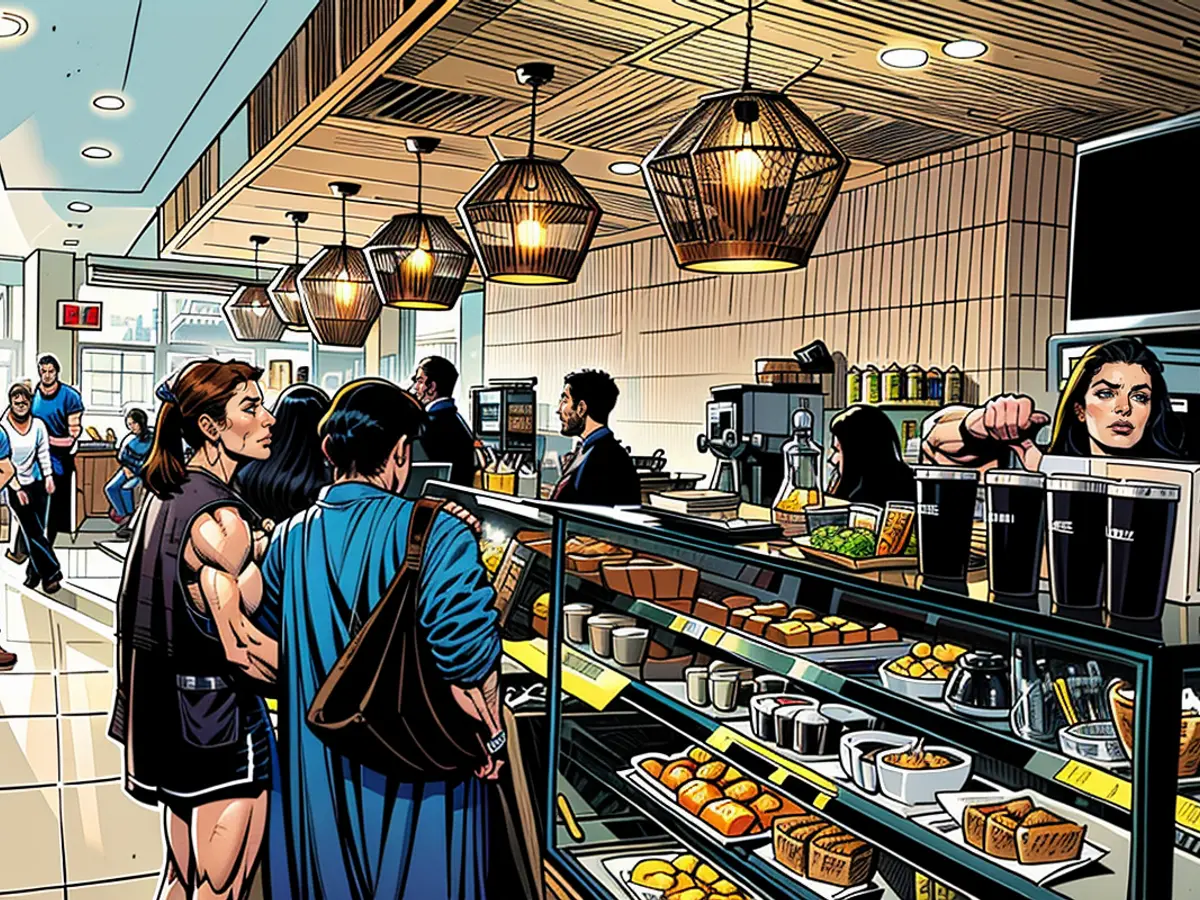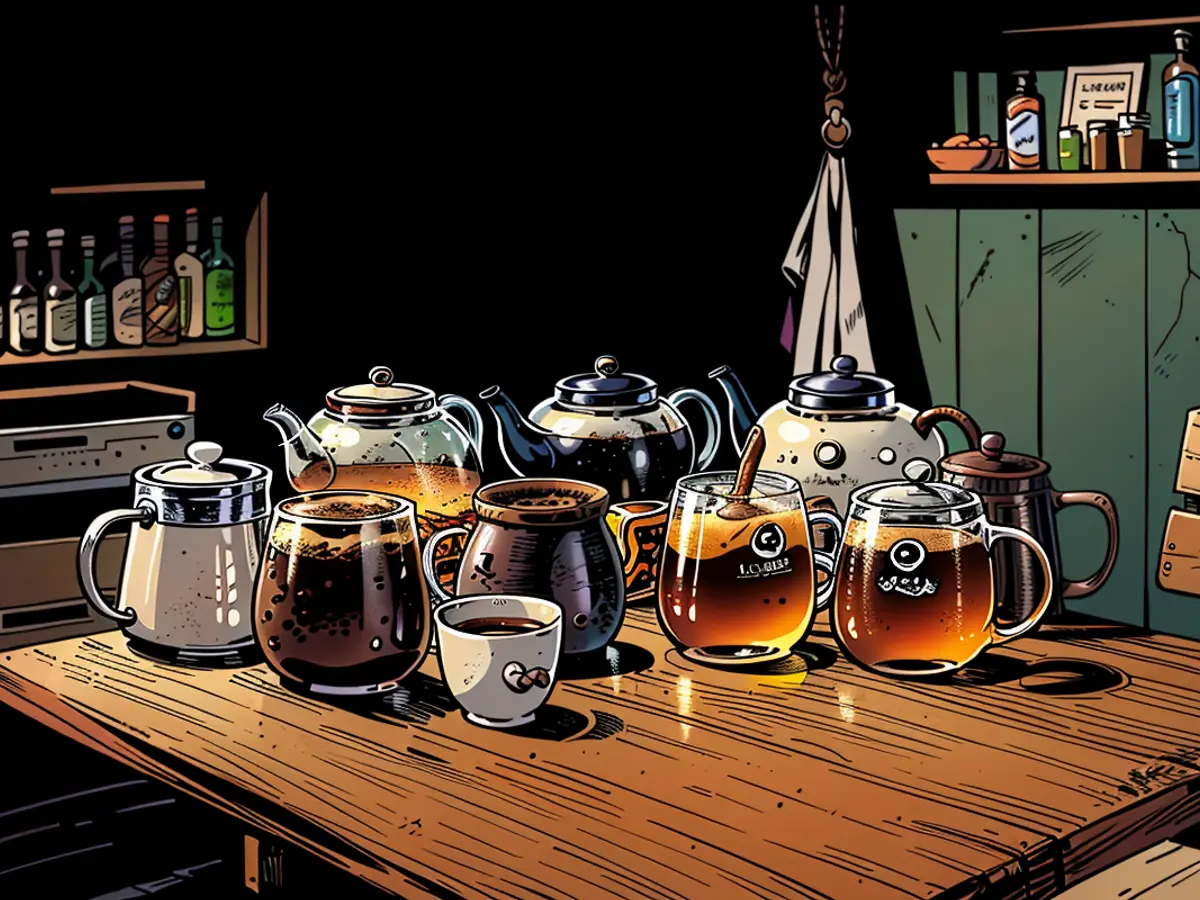The soaring interest in Yemeni coffee houses reveals insights into the concept of 'third places'.
Stepping into Qahwah House on Carmine Street, a pungent aroma of cardamom and Middle Eastern melodies fill the air, accompanied by a throng of individuals chatting and waiting in line to order. The vibrancy spills onto the sidewalk where some engage in a traditional Levantine dance known as dabke. The atmosphere reflects various Eastern cultures, with Arabic, Farsi, and Urdu spoken, and some patrons don traditional attire.
Qahwah House is part of a proliferating chain of Yemeni coffee shops that originated in the Arab-populated Detroit area and have expanded across the nation, frequently in areas with sizeable Middle Eastern and Muslim populations. Currently, there are 19 Qahwah House locations spread across seven states, with several more under construction, expecting to open this year. Parallel to Qahwah House, Haraz opened in the affluent SoHo neighborhood in Manhattan, with at least six other locations planned in the next couple of years. Additionally, Times Square will see the arrival of two other chains, MOKAFÉ and Qamaria Yemeni Coffee Co.
The unprecedented expansion of these establishments is indicative of the demand for late-night hangouts not only among young Muslims and Middle Easterners but also younger individuals seeking an alcohol-free, non-digital space to socialize.
Existing venues like malls have diminished in popularity, while chains like Starbucks have become take-out counters. Moreover, sober bars and alcohol-free lifestyles have gained traction among individuals outside of the Muslim faith. As a result, these Yemeni coffee shops provide a unique third-place option for urban youth, especially those hailing from immigrant communities who are eager to connect with their cultures.
As Bhavishya Banda, a strategy consultant, remarked one late night at Qahwah House, "New Yorkers like to go out clubbing, but I don't find enjoyment in that. But I want to go out at night."
Third spaces have been in existence long before, with sober bars emerging across the country, specifically to foster a sense of community and social connections. However, Yemeni coffeehouses have successfully integrated these trends and flourished considerably.
Younger individuals, particularly the offspring of immigrants embracing two different cultures, appreciate the opportunity to consume something rooted in tradition but displayed in a contemporary, modern setting. According to Sally Howell, professor of Arab American studies at the University of Michigan–Dearborn, "Yemeni coffee houses have taken up both those trends and boomed."

The history of Yemeni coffee shops
In the Middle East, coffee was never a quick grab-and-go drink used for instant wake-ups, but rather a social interaction. While coffee beans originated in Ethiopia, the earliest evidence of cultivation emerged in Yemen through Red Sea trade.
Whether in the early 20th century or during the first wave of Middle Eastern immigration to Detroit to work in the auto industry or shipping yards, coffeehouses were among the first institutions established. These coffeehouses served as gathering places for immigrants to socialize, share news about their home countries, and pen letters back home. Many of the initial mosques in the area were situated in the backs of coffeehouses.
Yemeni men who worked on the Great Lakes shipping for extended periods and had minimal time off from work relied heavily on coffeehouses in Detroit. These establishments offered a sense of community during their lengthy absences from their families in Yemen.
Ibrahim Alhasbani, founder of the first modern Yemeni coffee chain, Qahwah House, emphasized their mission as bringing people together and sharing stories. As he explained to CNN, "Our mission is to bring everyone in one place and share history. That's why we serve the coffee in a pot. People come inside the store and they share one pot and they can talk and they share different stories."
A new era for Yemeni coffee

Contemporary chains have been adapted to cater to the new generation of Yemeni immigrants who are interested in showcasing Yemeni coffee culture to the American mainstream.
The initial Qahwah Houses in Dearborn boasted a familiar coffee-shop aesthetic, appealing to a savvy clientele. Yet, they also integrated the rich Yemeni culture, such as using locally sourced coffee beans, displaying artifacts from the region, and proudly showcasing the founder's family tree on the wall.
The founding of the contemporary Yemeni coffeehouse chains, such as Qahwah House, has been made possible by the support of a well-established community in the area. Individuals like Alhasbani have been backed by investors, including Yemeni entrepreneurs, professionals, medical professionals, and engineers who contribute to the community by financing newcomers.
Business experts suggest that customers are attracted to authenticity, which is often given top priority in the specialty coffee and entertainment industries. For instance, Alhasbani personally mixes the drink's components at his facility in Michigan and sources coffee beans directly from farmers in Yemen.
Hovig Tchalian, Assistant Professor of Clinical Entrepreneurship at USC Marshall School of Business, explained to CNN, "There's been a lot of emphasis, especially in specialty coffee but also in the entertainment space, on being authentic and being real."
Growing Beyond Detroit

During the day, Yemeni coffeehouses serve essentially the same role as many local spots, with patrons hosting meetings, students studying, and some grabbing a quick coffee to go. However, at night, they fulfill the essential role of thriving third spaces where communities can connect, exchange ideas, and celebrate their shared heritage.
At night, these establishments serve as makeshift living rooms, particularly for young Muslims who avoid nightlife venues like clubs and bars. From New York to Dallas, especially during the late nights of Ramadan, these spots often spill out onto the streets, making it necessary to raise your voice to be heard inside. Some young Muslims even dare to visit these coffee shops in the hopes of finding a potential partner.
This coffeehouse culture is most evident and celebrated in Dearborn, Michigan, a suburb of Detroit with a large Arab American community.
Downtown Dearborn is dotted with various Yemeni coffeehouses, which, according to Howell, played a significant role in revitalizing the Detroit area following the city's bankruptcy in 2013, making it the largest municipality to file for bankruptcy at the time. And the trend only continues to grow.
"It's become quite infectious," Howell remarked. "Several Yemeni entrepreneurs are opening their own coffeehouses, each with its unique style and atmosphere."
These coffee chains have ambitious expansion plans beyond Dearborn. Qahwah House aims to open 20 to 30 new locations within the next year, extending across 12 states and Canada. They are also considering franchise opportunities, but Alhasbani is selective about who he grants a license to.

"I receive more than 10 requests a day to open this type of business," he said. "We only give a license to someone once we're certain they have a genuine love for the brand and are fully invested in Qahwah House."
Another authentic Yemeni coffee chain, Haraz, also experiences a steady stream of customers throughout the day and night. They recently opened a location in New York City, just half a mile away from Qahwah House's downtown Manhattan shop, and plan to expand further.
However, growth comes with its challenges. Haraz sources its coffee directly from the high-altitude region in Yemen it's named after. Due to issues with shipping from the Red Sea, co-franchisee Ahmed Moustafa has a three-year supply of beans in Michigan to meet demand while preserving the original flavor.
Haraz's latest location boasts a design inspired by Islamic architecture, with pointed arches adorning the walls. Located in pricey Soho, the goal is to appeal to a wider audience beyond Middle Eastern communities in Brooklyn and Queens.
"I received feedback from a woman who lives near the area," Moustafa explained. "She said, 'I didn't even know coffee from Yemen existed.'"
Qahwah House's expansion strategy has been successful not only within the Muslim and Middle Eastern communities but also among younger individuals seeking an alcohol-free social space. This trend has led to a rise in sober bars and a decline in the popularity of malls and take-out counters like Starbucks.
The revival and growth of Yemeni coffee shops have greatly contributed to the revitalization of downtown Dearborn, Michigan, offering a unique space for communication and cultural exchange, especially among the younger generation.









